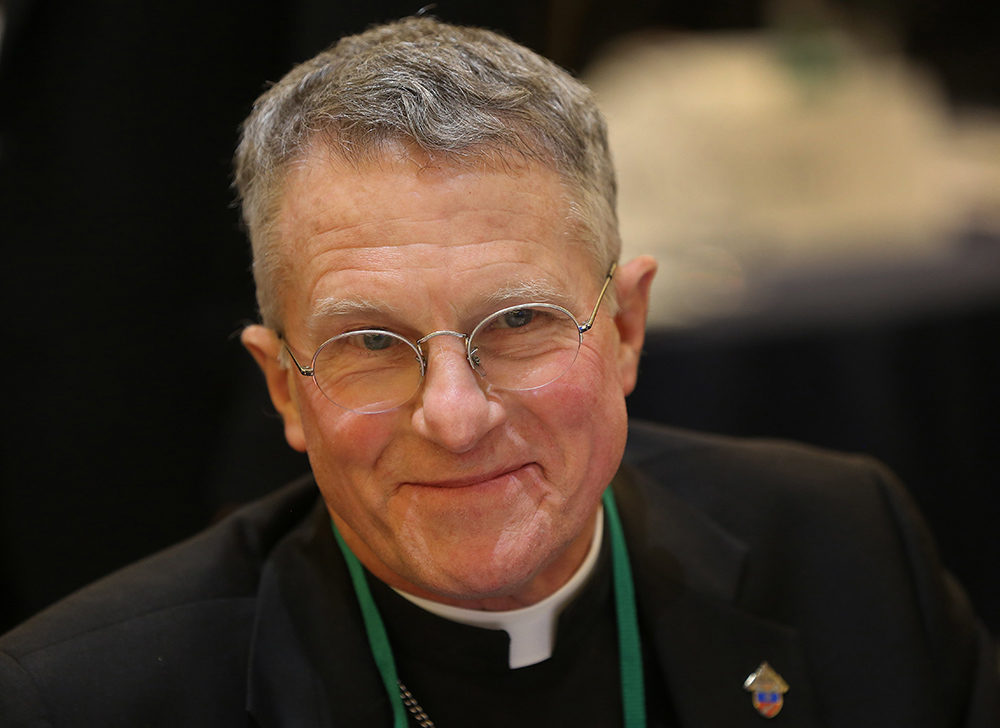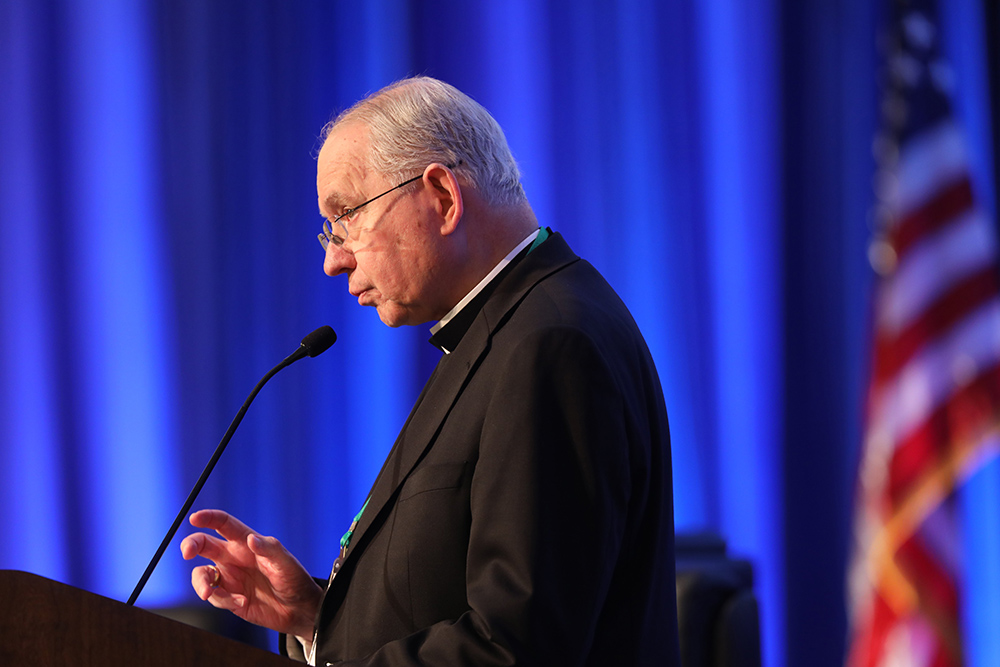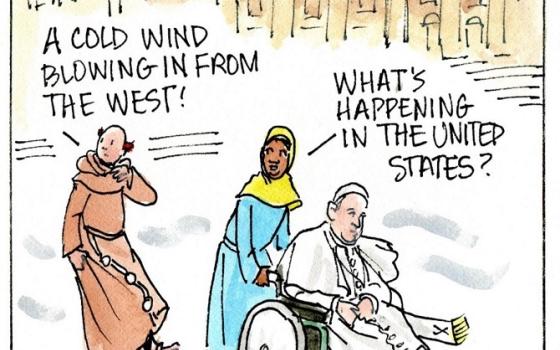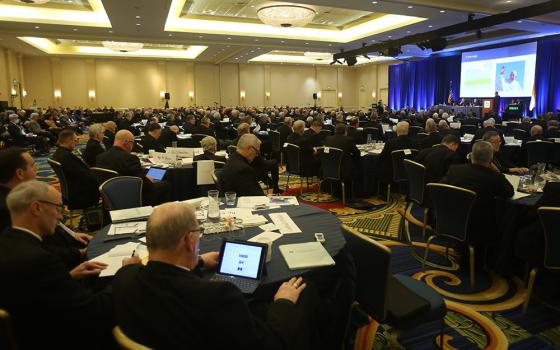
Archbishop Timothy Broglio of the U.S. Archdiocese for the Military Services smiles Nov. 15 after being elected president of the U.S. Conference of Catholic Bishops during a session of the fall general assembly of the bishops in Baltimore. (CNS/Bob Roller)
Editor's note: This story has been updated with additional reporting.
The U.S. Catholic bishops' conference on Nov. 15 elected Archbishop Timothy Broglio, a former Vatican diplomat who has supported religious exemptions for coronavirus vaccines and has blamed gay priests for the clergy abuse crisis, as their new president.
Broglio, who as the archbishop for the Military Services is essentially the nation's chief Catholic chaplain, garnered 138 votes on the third round of voting at the bishops' plenary assembly in Baltimore. He needed 119 votes, a majority of the 237 total votes cast.
Baltimore Archbishop William Lori, who finished second in the presidential voting, was elected vice president in a separate round of voting.
Broglio, 70, has served in his current role since 2008. As a Vatican diplomat, Broglio served as the Vatican's ambassador to the Dominican Republic and its delegate to Puerto Rico from 2001 to 2008.
In the 1990s, Broglio served as private secretary for the late Cardinal Angelo Sodano, the Vatican secretary of state under Pope John Paul II who was a staunch promoter and defender of then-Fr. Marcial Maciel Degollado, the serial sexual abuser and founder of the once-powerful Legionaries of Christ religious order.
In 2018, Broglio supported a U.S. Air Force chaplain who in a homily blamed "effeminate" gay priests for clergy sex abuse. In an emailed response to a woman who complained about the priest's homily, Broglio said there was "no question that the crisis of sexual abuse by priests in the USA is directly related to homosexuality."
A 2011 John Jay College of Criminal Justice report on the causes and contexts of clergy sex abuse found no statistical evidence to back that claim, which is popular among conservative Catholics.
During the coronavirus pandemic, Broglio supported vaccine exemptions for military members on religious objection grounds, writing in October 2021 that "no one should be forced to receive a COVID-19 vaccine if it would violate the sanctity of his or her conscience."
In a press conference following his election as president, Broglio defended his work with Sodano, saying, "Hindsight is always 20/20." The archbishop said he had left the Vatican secretariat by the time the "great accusations" against Maciel had been reported.
Broglio also defended his earlier remarks about the impact of gay clergy on the sexual abuse crisis, claiming: "It's certainly an aspect of the sexual crisis that can't be denied."
In contrast, the 2011 John Jay report stated: "No single psychological, developmental or behavioral characteristic differentiated priests who abused minors from those who did not."
Advertisement
Lori, 71, has been archbishop of Baltimore since 2012. He was previously bishop of Bridgeport, Connecticut, and an auxiliary bishop in Washington, D.C. He is the current supreme chaplain of the Knights of Columbus.
As chairman of the conference's ad hoc religious liberty committee, Lori played a leading role in the conference's fight against a rule in the Obama administration's signature health care law that required employers to provide contraception coverage in health insurance plans.
In 2020, the conference elected Lori to serve as chairman of its Committee on Pro-Life Activities. In that capacity, Lori has praised the Supreme Court's June decision overturning Roe v. Wade, which had guaranteed a constitutional right to abortion.
In recent weeks, however, Lori has appeared to take a more moderate stance with regard to a possible national abortion ban, saying that Catholics can support lesser measures such as a 15-week abortion ban.
In a press conference just before the presidential election on Nov. 15, Lori focused on the church's pro-life efforts and said it is "a time that is fraught with both opportunity and challenge" for the anti-abortion movement.
Asked about the raft of anti-abortion ballot measures that voters rejected in eight states during the Nov. 8 midterm elections, Lori said the church needs to undertake a "continual tilling of the soil of people's hearts" on the issue.
"The job for educating, catechizing, [and] evangelizing before us is perhaps even more massive than we thought," said the archbishop.
In brief remarks following his election as conference president, Broglio commended the outgoing president, Archbishop José Gomez of Los Angeles, and the outgoing vice president, Archbishop Allen Vigneron of Detroit.

Los Angeles Archbishop José Gomez gives his final presidential address Nov. 15 during a session of the fall general assembly of the U.S. Conference of Catholic Bishops in Baltimore. (CNS/Bob Roller)
Gomez's three-year tenure as conference president was a turbulent one. Under his leadership, deep and bitter divisions among the bishops broke out into the open amid the November 2020 election of President Joseph Biden, a Catholic Democrat who supports abortion rights.
As the conference president, Gomez delivered a dour congratulatory statement after Biden's election in November 2020, where the archbishop criticized the president-elect for his stance on abortion, and announced that he was appointing a special working group to examine the "difficult and complex situation."
In 2021, Gomez angered Black Catholics in the United States when he delivered a speech to a Catholic group in Spain where he denigrated modern social justice movements like Black Lives Matter as Marxist-inspired, anti-Christian "pseudo-religions."
In his final address as conference president, Gomez said the "trials" of the present age were "spiritual."
"We live in a noisy, distracted media culture," said Gomez, who added that American society is moving "hard and fast to uncompromising secularism" and that "traditional norms and values are being tested like never before."
Gomez told journalists in a press conference on Nov. 15 before the presidential election that he thought his three-year tenure had occurred during an "extraordinary time," especially with the ongoing coronavirus pandemic.
Asked by NCR what he considered a success of his presidency, Gomez said he thought he had "strengthened the fraternity among the bishops." Gomez said the bishops are "talking with each other and being more united."
Later during the meeting on Nov. 15, Brownsville, Texas, Bishop Daniel Flores, who guided the synodal listening process in the United States, explained the next steps in the continental phase of the 2023-24 Synod of Bishops. In October, the Vatican released a 45-page document that will guide the continental phase.
"The synod is a process of recollection, of looking at our recent experience of listening to one another, to better understand our present pastoral reality, more realistically," said Flores, who told the conference that church leaders in Canada and the United States will hold 10 virtual "continental assemblies" in December and January.
Five of those continental assembly sessions will be in English, three in Spanish and two in French. Each diocese is asked to appoint three to five delegates to participate in the assemblies. Flores said the delegates should reflect the diversity of local churches, including the marginalized.
Flores said the assemblies will be held virtually instead of in-person gatherings because of the short time frame. He also said the virtual format is less expensive and allows for the greatest number of delegates to participate, especially "those most hidden in our peripheries" who are the least able to travel.
In remarks from the floor, Cardinal Joseph Tobin of Newark, New Jersey, said he was disappointed with the virtual sessions. He opined that in-person gatherings are preferable, comparing the synodal process to the V Encuentro, which met in September 2018. Tobin said he hoped church leaders in the United States could facilitate something in person with their Canadian counterparts.
The bishops also acknowledged the 20th anniversary of the "Charter for the Protection of Children and Young People," a document commonly known as the Dallas Charter, which established new norms and policies in the United States to investigate sex abuse allegations in church settings.
"The past 20 years have been a time of growth and awareness, an opportunity for reflection and action, a period of examination, conversion and transformation," said Kansas City-St. Joseph, Missouri, Bishop James Johnston Jr., chairman of the conference's Committee on the Protection of Children and Young People.
Johnson said that "a debt is owed that can never be truly paid" to clergy sex abuse survivors.
Mark Joseph Williams, a survivor from the Newark Archdiocese, told the bishops that he prayed that they would keep "an unwavering commitment" to hear the voices of survivors.
"The charter must continue to evolve," Williams said. "Accountability at all levels is of the utmost importance to more fully realize a synodal church."
The bishops gave Williams a standing ovation after his address.
[NCR news editor Joshua J. McElwee contributed to this report.]





